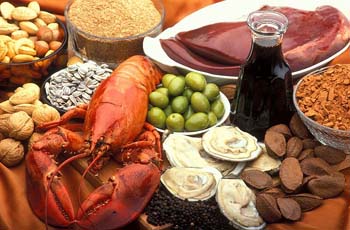| Home A B C D E F G H I J K L M N O P Q R S T U V W X Y Z |
|
Home |
Cooper Deficiency: Symptoms, Causes
|
||
 Foods rich in copper. |
Copper is a trace mineral that is essential to good health. It is required for infant growth, bone strength, red and white blood cell maturation, iron transport and adsorption, cholesterol and glucose metabolism, maintaining a healthy heart (heart contraction), brain development, maintenance of the body's immune function, and protection against oxidative and inflammatory damage.
The website CopperInfo.com states that at least 20 percent of the population suffers from a deficiency of copper.
SYMPTOMS:
Symptoms can range from crippling neurological degeneration in Menkes disease — a classic copper deficiency disease — to fatigue, paleness, skin sores, dermatitis, edema, slowed growth, hair loss, diarrhea, brittle bones, and anemia.
According to CopperInfo.com few people are aware of the health disorders that are associated with copper deficiency:
Symptoms of mild copper deficiency include:
CAUSES:
In contrast with Wilsonís disease, in which there is too much copper in the body, this is a disorder in which there is not enough.
Without enough zinc, copper cannot be absorbed and used. Without copper, iron cannot be absorbed and used.
Possible causes include: bariatric surgery, zinc toxicity, and hereditary disorders. You may also get a copper deficiency if you:
PREVENTION:
Eating a balanced diet, with a range of food from different food groups, is the best way to avoid copper deficiency. The best dietary sources of copper are seafood, especially shellfish, organ meats, whole grains, nuts, raisins, legumes and chocolate. Also good are cereals, yamso potatoes, peas, red meat, dark green leafy vegetables, and some fruits, such as coconuts, papayas and apples.
Copper supplements can prevent copper deficiency, but they should be taken only under a doctor's supervision.
|
Glossary References Links Contact
|